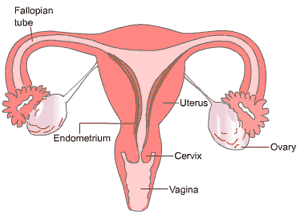There can be many factors responsible for breast cancer. There are different kinds of risk factors such as the environment, genes, lifestyle and age that play a great role in developing breast cancer.
Gender:

- Women are more likely to develop breast cancer as compared to men.Women have many more breast cells than men, and their breast cells are constantly exposed to the growth-promoting effects of the female hormones estrogen and progesterone. Even men can develop breast cancer, but the disease is about 100 times more common among women than men.
Age:
- Breast cancer is less common in younger women.Your risk of developing breast cancer increases as you get older and just doubles over a period of 10 years until the menopause. Studies show that a quarter of breast cancers affect women under the age of 50, a half occur between the ages of 50 and 69 and the remaining quarter develop in women who are 70 years or older.
Family history / Hereditary factors:
- Family history of close relative like mother, sister and daughter who has been diagnosed with breast cancer doubles the risk factor.
Reproductive factors:

Menstruation:
- Women who start menstruating early in life (before 15-16 yrs) or who have a late menopause (after the age of 50), have an increased risk of breast cancer.
Pregnancy:
- Not having children, or having them later in life: Having no children or having the first child after age 30, both increase the chances of breast cancer.
- Women having their first child after 30 yrs of age are two times more likely to develop breast cancer as to those who have their first baby befor the age of 30.
- Pregnancy reduces a woman’s total number of lifetime menstrual cycles.Therefor, frequent pregnancies before the age of 30, reduces breast cancer risk.
Using oral contraceptives:
- Women using oral contraceptives (birth control pills) for many years are at a slightly greater risk of developing breast cancer in the future than women who have never used them. Women who started taking the Pills before the age of 20 appear to have a higher risk than women who begin taking oral contraceptives at an older age. Ladies who wish to use oral pills should do so only after consulting their doctor. It is very important to have a fair knowledge of the risks associated with certain pills.
Using post-menopausal hormone therapy (PHT):
- There is an increased risk of breast cancer in women who use post-menopausal hormone therapy (PHT) also known as hormone replacement therapy (HRT) and menopausal hormone therapy (MHT).
Not breast-feeding:
- Women who don’t breast feed their children are at a higher risk of developing breast cancer. Various studies suggest that women who breast-feed their children for atleast 1½ to 2 years, are less likely to suffer from breast cancer.
Previous breast disease :
- A woman with a personal history of breast cancer in one breast has the risk of developing a new cancer in the other breast or in another part of the same breast.
Radiation :
- Exposure to radioactive rays are carcinogenic and increases the chances of developing breast cancer in women. women who received radiation to the chest as a result of repeated X-rays, or those who received radiation therapy to the chest have a higher risk of breast cancer.
Exposure to harmful chemicals:
Women who work in a chemical factory are more likely to develop breast cancer due to their exposure to many harmful chemicals like Organochlorines.
Breast implants:
![]()
- Silicone breast implants can cause scar tissue to form in the breast.In many cases the silicon can burst and flow into the lymphs and cause cancer.Implants also make it harder to see breast tissue on standard mammograms.
Dense breast tissue:
- Large breasts means denser breast tissue.Women who have denser breast tissue (as seen on a mammogram), have more glandular tissue and less fatty tissue, and have a higher risk of breast cancer. The density also makes it difficult to spot any problem in the breasts during mammograms.
Lifestyle-related factors and breast cancer risk
Wearing underwire bras:
- A healthy lymphatic system prevents breast cancer.Wearing underwire bras for a long time, cuts off the circulation of the blood in the armpit area.As a result, your lymph nodes are not able to properly eliminate the cancer causing waste materials accumulated in the body.
Cigarette smoking:
- Though, no conclusion has yet been drawn out for cigarette smoking causing breast cancer, still some studies have suggested that smoking increases the risk of breast cancer.
Alcohol consumption:
- Use of alcohol increases the risk of developing breast cancer. The risk increases with the amount of alcohol consumed. Women who have 2 to 5 drinks daily have about 1½ times the risk of women who drink no alcohol.
Lack of physical activity:
- Physical activity in the form of exercise reduces breast cancer risk.Just walking 10 hours a week alone reduced the risk.45 to 60 minutes of intentional physical activity a week reduces your risk of breast cancer.
Whether or not you have a family history of breast cancer, or show any of the above symptoms, you should be more concerned about the possibility of developing the disease by the time that you hit your 40’s. Frequent check-ups not only ensures early detection of breast cancer but also promises a stress free and happy life. Be aware of the changes in your body if you want to win the fight against breast cancer.

